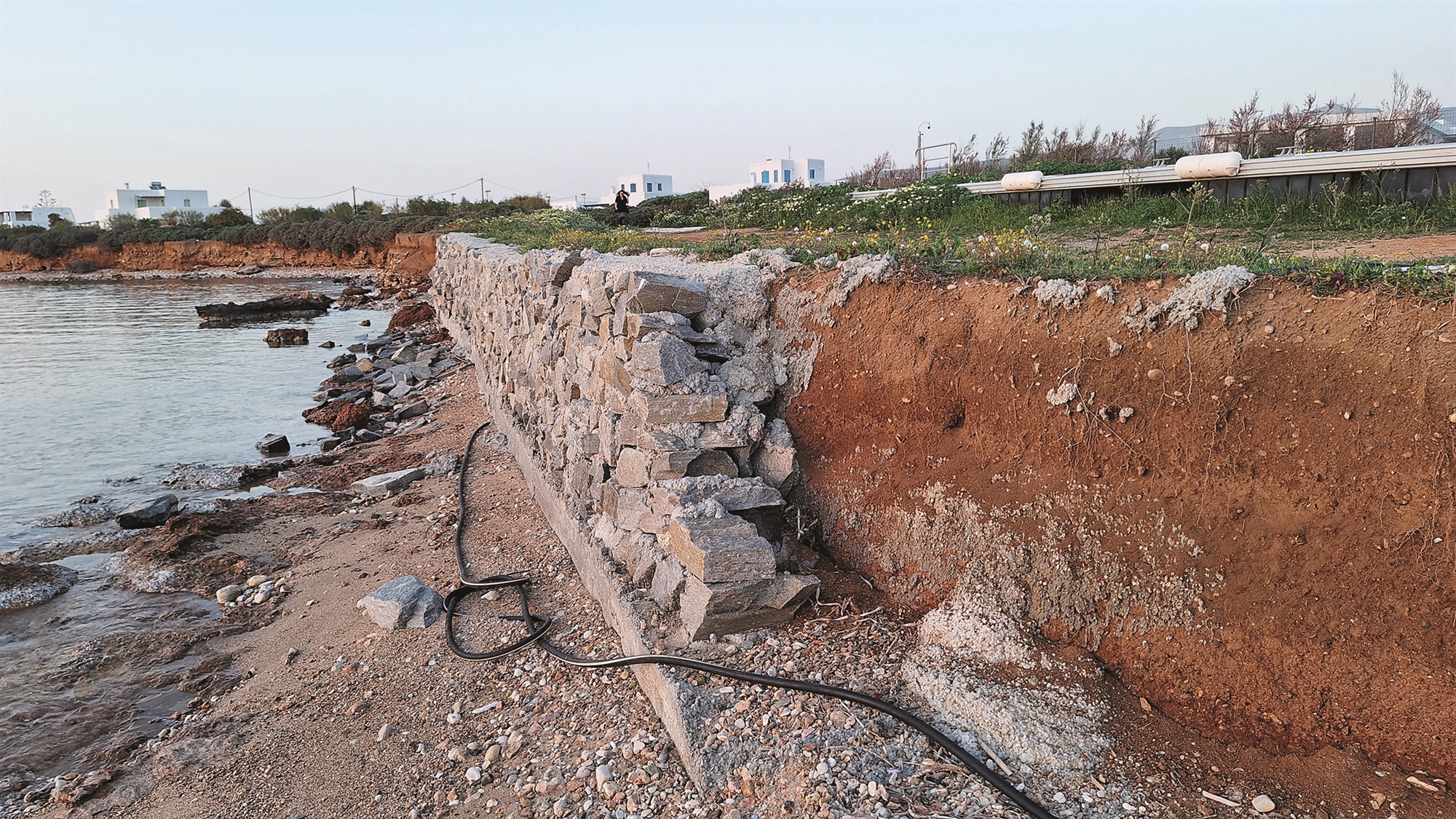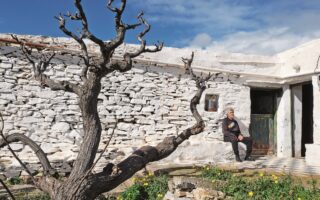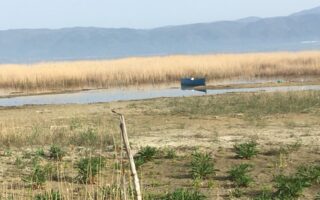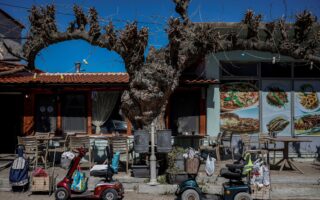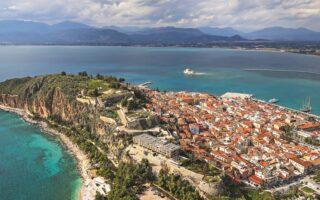An ‘Attica suburb’ in the Aegean
For a fifth year in a row, Paros has topped the number of building licenses issued for the Cyclades islands
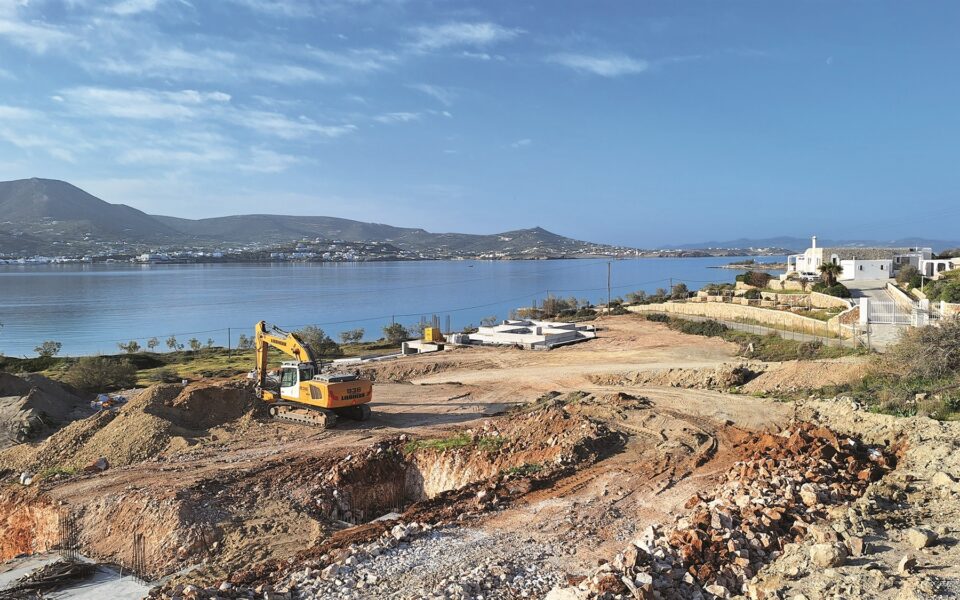
First stop: “See that house at the end of the green slope? The man who owned it kept the area as it was, untouched, refusing to sell it no matter how much he was offered. Now it’s passed on to his son, who’s selling it for 1.5 million euros. There goes that.”
Second stop: “When construction on this house began, they chopped down the junipers and the owner ended up in court. He lost every suit, but the house was still built; don’t ask how. Now he’s poured concrete over the dirt patch people used to park their cars when heading down to the beach and is prohibiting public access to it. He has goons who chase people away.”
Third stop: “Look at that building, dug into the rock. Its facade is nearly 90 meters long, like a supermarket. Three more followed it. Just look at what they’ve done to the hillside.”
Fourth stop: “Three buildings were constructed right along the top of the hillside. They buried the footpath in debris and destroyed 200 meters of drystone walls, which is also not allowed.”
Fifth stop: “This area is a wetland. See how the building sites are encroaching on it. Water was being pumped out of the wetland for days before construction could begin on one of them.”
Tonia Pantelaiou, a member of the Paros Citizens’ Movement and of the Agairia Cultural Society, is jumpy behind the wheel of the car, as every turn in the road is a new story, each as distressing as the previous one. Some are apparent at first glance; others need closer scrutiny. But even if we didn’t have Pantelaiou as our guide, it’s impossible to miss the sheer scope of Paros’ destruction. Almost the entire island – the third biggest in the Cyclades cluster in terms of size – has been built upon. In some parts it’s sparse, but in others, the construction is so dense, it looks like a suburb in Attica, but with Cycladic-style houses.
Yet construction has continued unabated. According to recent Hellenic Statistical Authority (ELSTAT) data, Paros has topped the other Cycladic islands for the number of building licenses issued for a fifth year in a row. It has even shot past Mykonos and Santorini in the square meterage these licenses represent. One of the main drivers is the type of building being constructed: Big villas intended for short-term leasing and sales markets and hotels.
The situation has spiraled so far that even professionals in the sector are getting alarmed. “I started my realty firm in Paros in 2003 and have witnessed the change. Since 2017 and to this day – with the exception of a brief period during the pandemic – buildings keep going up on the island, to the extent that its entire character is changing,” says Filia Grigoraskou, president of the Association of Residential Real Estate Agents for Paros and Antiparos, a smaller island off its coast. “Large residential properties intended for commercial exploitation are the norm these days, with most of the owners coming from France, Italy, Israel, Switzerland and, more recently, from the United States. These tend to be people who are well-educated and well-off, many of whom are buying with the intention of renting the property or selling it at a better price some time in the future. This may be my job – and my husband’s, who is a civil engineer – but I think the situation has become precarious. There will soon be nothing left. It’s so completely out of proportion that you have to wonder how it will ever be stopped or scaled back. This would require very strict laws and limitations – and I am certain that the state doesn’t have the same point of view,” she says.
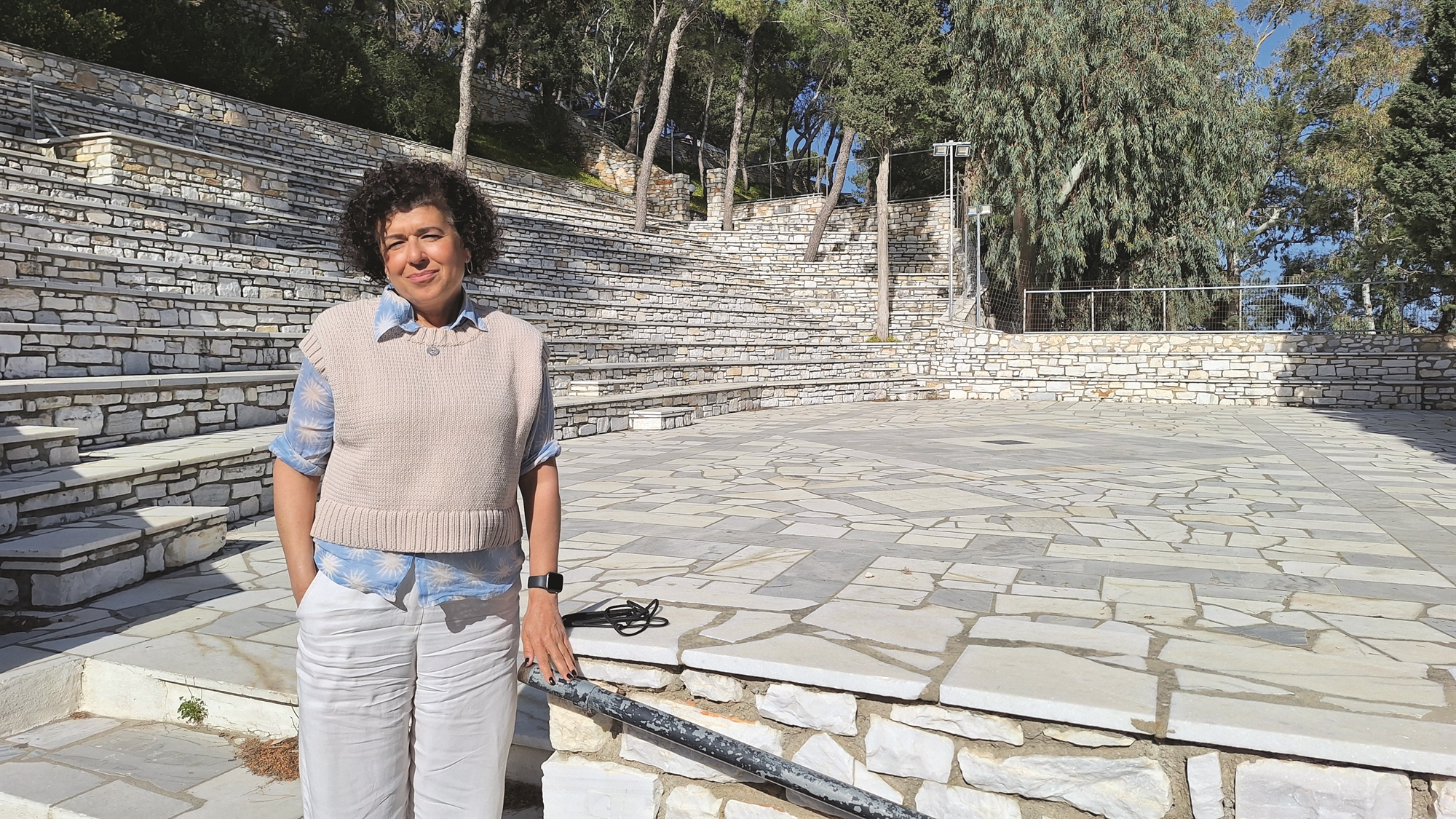
Local civil engineers like Giorgos Evripiotis are also concerned. “More than 1,000 licenses will be issued this year, while some 350 buildings are already in the process of being erected on Paros and Antiparos. Everyone knows that the zoning plan for these two islands has started, so they’re in a rush to get building permits before it happens, as was the case in the 1980s, with the urban redevelopment program,” he says.
“The situation had already started deteriorating when the international airport was announced and many people started buying land or property without even knowing where Paros was on the map. The biggest damage, in my opinion, though, comes from the ‘yposkafo’ constructions,” Evripiotis adds, referring to a much-abused style of vernacular architecture whereby structures are built deep into the rockface. “They dig 15 meters into the rock to build them, cutting into hillsides and destroying the natural contours and terrain.”
Joining villages
Excessive construction has brought all the problems that cities face to this island. “Villages once had boundaries. Now, the area from Parikia all the way to Parasporos has become one thing. This has consequences,” says Ilias Petrakis, who owns a small hotel with his wife and is also a member of the Paros Citizens’ Movement and the Archilochus Cultural Association. “Parikia has a terrible traffic problem in the summer; it takes an hour to get from one end of the town to the other. And you can’t even build new roads, because it’s surrounded by residences and hotels. It’s shocking how much the island has changed in the past five years; I sometimes feel like I’m living in a dystopia.”
These tectonic shifts also have social ramifications, chiefly making locals feel like strangers on their own island, which is rapidly being transformed into a stage set for a specific style of tourism.
‘We’ve lost control; we’ve lost our quality of life. We have problems we never had to contend with before: traffic, trash, water and even crime, which was practically unknown to us’
“It was a good life until 2000,” says Nikos Tsounakis, who owns a taverna in Kolymbithres. “Tourism brought in a lot of money in the 1980s and 90s, but it was all so much more romantic. Now the island is on the path of Mykonos and Santorini. Life has become unaffordable. Money is all that matters; we’ve lost control; we’ve lost our quality of life. We have problems we never had to contend with before: traffic, trash, water and even crime, which was practically unknown to us. We’ve also lost our island character, our way of life. You see people battling depression. Society has changed: No one lives in Naoussa anymore; they rented their homes to businesses. You couldn’t live in Naoussa for the noise in any case; the whole village has become a business.”
Sevastianos Anagnostopoulos is an agronomist and looks after several gardens on the island. His ancestral home is in Santa Maria. “Until the 1980s, there were five houses in Big Santa Maria (Alyki) and another five in Small Santa Maria. This changed a lot in the 1990s. Some people built summer houses and came for the holidays, then in the 2000s, the contractors arrived and started building villas to sell as vacation homes. Now we have investors who buy land and build rental units, using the proceeds to buy and build more. Very few of the gardens I tend to belong to houses that are not leases. There are so many villas being built that rental prices started dropping last year because of oversupply. Sure, it all means I have work, and a lot of it, but this is no longer my home.”
Anagnostopoulos is afraid that if a ban on new builds is not introduced for the period it will take the state to carry out the new zoning plan, the island will be in even more trouble than it’s already is. “When a project is under way or in public consultation for four or five years, it only facilitates fire-sales. Everyone who is afraid that building limitations will be imposed on their area under the new zoning plan and cannot afford to build themselves, will try to sell. Then the investors will swoop in and so many permits will be issued that they’ll be erecting new buildings for the next decade. Construction is the only source of growth for this state; build up and cash in – that’s all it cares about.”
‘Sell, sell, sell’
Conflicts with the local community are numerous: from reactions against illegal claims of ownership on beaches and beekeepers who keep getting chased out wherever they try to place their hives because the bees are drawn to swimming pools, to elderly residents being pressured to sell their homes by the owners of neighboring luxury villas. Kathimerini was alerted to cases of residents who are constantly being harassed to sell, often with the discreet complicity of the local authorities. Their stories cannot be published for their own protection, but the words of one of the victims of this campaign are telling: “We’ve been made to feel like strangers in our own home.”
Can the island still pursue a different path? Kostas Bizas is one of those Cycladic mayors who was elected because he has a different vision for the island; his election last October is, in fact, a sign that the local community does not believe that things are going well. “Tourism was a blessing for Paros. Ever since the 1970s, it has given people an income, allowed them to fix their homes, to create rooms to let and restaurants, to send their children to university, to improve their standard of living. Unfortunately, it was all done without a plan. People could build whatever they wanted, wherever they wanted. I saw it all happening and thought that there should be a way to protect the hills, the beaches and the villages’ traditional architecture. Unfortunately, we failed. The local community had no resistance. At the same time, the state allowed development to go on unfettered,” he says.
Bizas thinks Paros is at a tipping point. “We are watching the land sales, the number of building permits, and everything points to a worsening situation. Paros will be covered in houses and hotels, and visitors will leave with bad experiences. A barrier needs to be put in place. Perhaps the new zoning plan will fulfill that role, but what little agricultural land is left needs to be protected. We have fine wineries and we need to help them stay in business. The government needs to hear us: We don’t want ‘strategic investments’ or ‘special land development investments.’ We don’t want anymore yposkafa. They cause damage and have to stop. We don’t want certain beaches to be leased for private exploitation. In reaction to the new law about coastal exploitation, we sent an advised opinion to the Ministry of Finance explaining why we did not want Small Santa Maria to be leased. Just a few days ago, the Land Service asked us to send an opinion again because a business plan for just that was submitted.”
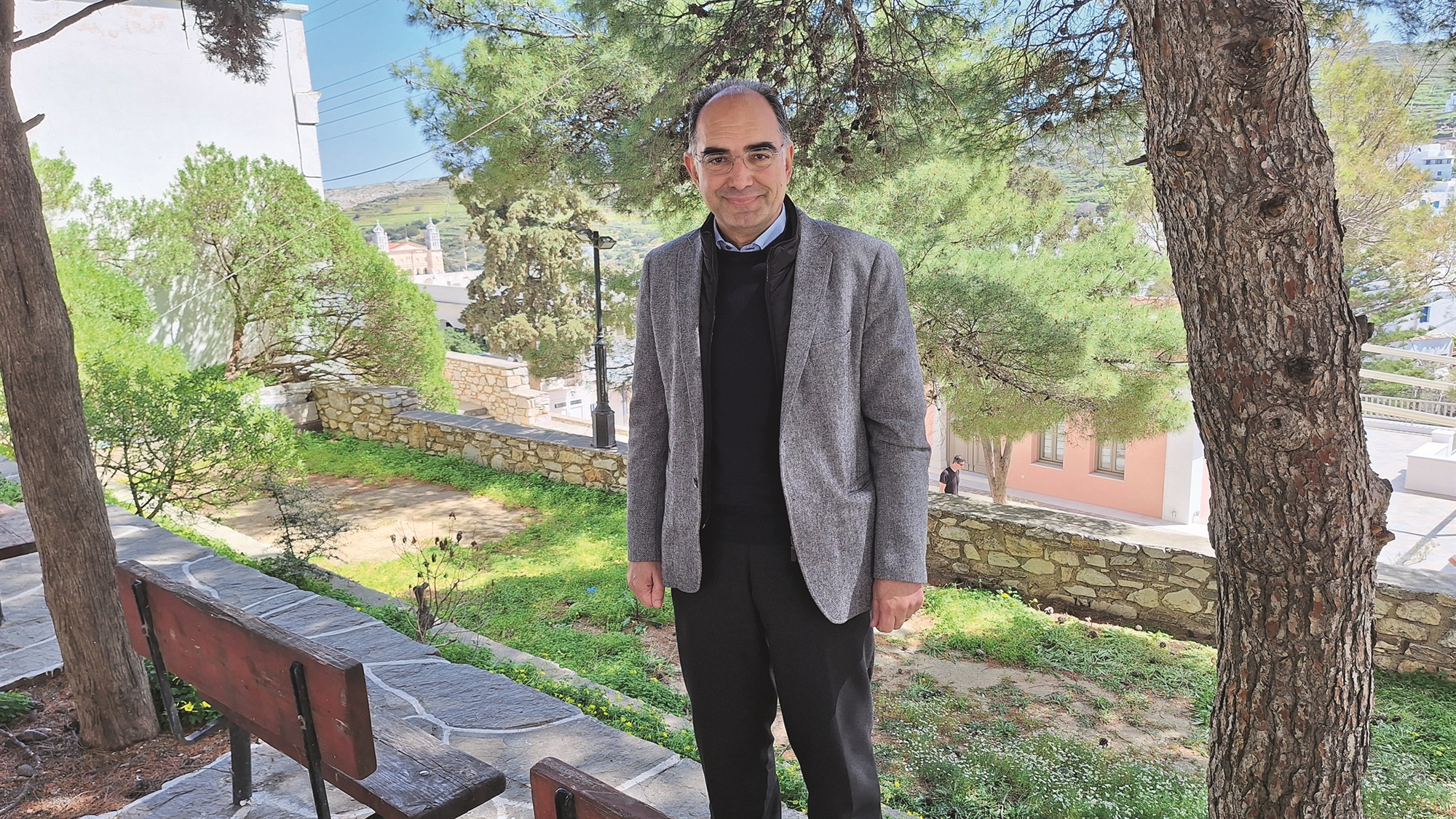
‘We’ll up and leave’
As for the citizens’ protest movements that erupted last summer in reaction to businesses taking over public beaches, Bizas is emphatic. “The citizens’ movement would never have been needed if the municipal authority and the Land Service had done their jobs. I signed 11 expulsion orders just the other day. What’s the point of asking a businessman to withdraw from a space he occupied last season? He should have done so in the autumn. I was approached by many businesspeople after I was elected who wanted to push me into facilitating activities that go against public sentiment and common sense. They are here to invest and if we say ‘no’ they threaten to ‘up and leave.’ All I have to say to them is, ‘I’m sorry, but I cannot help you.’”
Local reactions
One of the things that sets Paros apart from the other islands of the Cyclades is that the local community is taking a stand. Last year, it made headlines with its ‘free beaches’ movement, organizing protest rallies that garnered the support of hundreds of residents. The campaign used social media to show how businesses had taken over entire beaches – some of them big ones – with loungers and umbrellas.
The protests continued over the winter, this time against different infringements and eyesores. The first of these “off-season” protests was on Vagia beach, where a wall was built just half a meter from the water by the owner of a villa. Another took place earlier this month in Faragas, where someone blocked access to the beach, built a pier and was pouring concrete over the rocks in front of his house to create a deck.
“It’s important to look at who is organizing these protests: These are local associations representing these areas who for many years stuck to cultural matters only but are now taking issue with such problems,” says Tonia Pantelaiou, who is also the driving force behind a series of public information events on the new zoning plan.
“The issue of the beaches left a legacy,” says Damianos Gavalas, a professor at the University of the Aegean and an active member of the Paros Citizens’ Movement.
“The leadership at the municipal authority has changed, while a lot of new people who became involved in public life for the first time through the movement for the beaches were elected to the Municipal Council with both major parties. At the same time, the island’s associations are being rejuvenated with young people who are taking an interest for the first time. I think that the new municipal authority has good intentions, but will face enormous challenges. We’ve seen greed make people do unprecedented things; things that make us wonder whether the situation can ever be reversed.”
